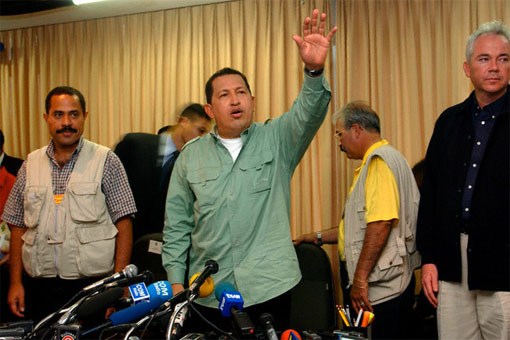Regimes that seek to limit civilian and political opposition have found a new tool in controlling their messaging: state-owned media.
This comes despite the fact that state media—like many means of communication—should serve the interests of all citizens and provide information free of commercial, state or political influence. According to a 2009 report by the special rapporteur for freedom of expression of the OAS Inter-American Commission on Human Rights, public media should be “independent of the executive branch; truly pluralistic; universally accessible; with funding adequate to the mandate provided for by law; and they must provide community participation and accountability mechanisms.”
In the Americas, the increasing manipulation of sate-owned media is particularly evident in Ecuador, Nicaragua and Venezuela where, unlike countries such as Canada, Australia, Japan, France, South Africa and the United Kingdom, there are no regulations entrusting that the official press serve the public interest.
The benefits for these three countries are clear: the official press allows leaders to multiply the reach of their messages while serving as a platform to launch smear campaigns and lambaste critics. This contradicts the basic notion of press freedom. Not only do these tactics add commercial and political influence to media outlets, but they effectively regulate free speech from the top down.
In Ecuador, President Rafael Correa typically devotes his Saturday radio broadcasts to launch verbal assaults—known as cadenas—against private media outlets, the most prominent of which is the leading daily newspaper El Universo. The Correa administration infamously sued El Universo’s opinion page editor and three directors last year after the newspaper published an opinion piece highly critical of his leadership. The four defendants were convicted of criminal libel and each sentenced to a three-year prison term; El Universo was fined $40 million in fines and damages. This case remains particularly worrisome even though Correa, facing significant pressure from international organizations and NGOs, relented and pardoned all four individuals in February 2012.
But this pattern began long before 2011. Shortly after assuming power in 2007, Correa started seizing media outlets, including two private television stations, in 2008. He justified these actions by saying that the outlets were owned by Grupo Isaías—a holding company that allegedly owed more than $600 million to the state after the collapse of its financial institution, Filanbanco, in 1998.
The president also has made a habit of forcing private broadcasters to air government rebuttals to critical commentary or reports. As recent as last month, press-freedom advocacy group Fundamedios reported that Radio Cadena Democracia – Exa FM was ordered by the Secretaría Nacional de Comunicación to pre-empt seven minutes of programming with a harsh and personal rebuttal after the broadcaster’s host, Gonzalo Rosero, criticized the Correa administration in a previous show.
Many regard Correa as having followed in the footsteps of Venezuelan President Hugo Chávez who exerts much of the same type of control over his own media institutions. Significant transformation has taken place in Caracas: when Chávez was inaugurated in 1999, he inherited a poorly financed state media apparatus that had two broadcasters and a news agency with a very limited reach. But after a failed coup in April 2002, Chávez realized that expansion of public media was the most effective way to counterbalance the influence of private media outlets and to better control the flow of information.
Since then, his administration has invested millions of bolívares in projects for state and community media, including television, radio, newspapers, and news websites. In July 2005, the government launched its most ambitious initiative: TeleSUR, a 24-hour news network branded as a Venezuelan alternative to CNN. Chávez himself has invested much of his time in being present on the airwaves; according to AGB Nielsen Media Research, between 1999 and 2010 Chávez spent more than 1,300 broadcast hours on the air. And as concern grows about his health, the president has looked to state outlets to personally issue health updates.
In the case of Nicaragua, President Daniel Ortega—also a member of the Bolivarian Alliance for the Americas with Venezuela and Ecuador—is emulating the actions of his counterparts. Ortega, who began his third presidential term in January, routinely categorizes journalists critical of his policies as “fascists,” “drug traffickers” or part of the “business elite”—and has deemed them either unelected members of the opposition or outright enemies of his government.
Ortega has also stacked the media waves with government-run outlets, either by launching one from scratch (Canal 13 last year), or in the case of tn8 in early 2010, acquiring it from a private broadcaster. Greater influence over the media is just one component of his strategy to control the press: Ortega picks and chooses which journalists can attend events and have access to ministers and other key staff. He has also never given a press conference, and his agenda is controlled by his wife, First Lady Rosario Murillo, and is virtually unknown by members of the private media outlets.
Despite the egregious use of state media in these three countries, others in the region are following a more balanced approach. Televisión Nacional de Chile; Canal 22: Canal Cultural de México; TV Cultura (Brazil); and Canal 14 – TV Pública Paraguay (launched last August as the first public TV station in the country) are examples of state media outlets that primary serve the public interest.
This is an encouraging sign. But do even these state media outlets serve the public in the best possible way? Of course, there is room for further improvement. But it is clear that publicly funded, one-sided state media outlets stymie opposition, threaten democratic governance and silence critics at the expense of freedom of speech.






